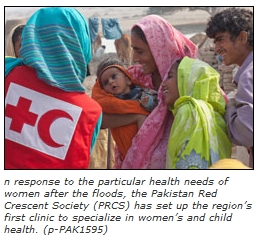mehr (engl.) ...
Some families were also forced to move several times, as flood waters kept advancing through Sindh province. Women found they were cut off from other villagers or families who would have traditionally supported them through the birth.
In Ghulam Hussain Ghadi village near Dadu, two mothers have had flood babies.
When the water came, Mirzadi Mumtaz took refuge in a temporary camp at a school near the MNV Drain. She gave birth to baby Fawad at the school. “It was a great worry to me, especially the delivery,” says Mirzadi. “I was away from the village midwives, the women who would have helped me through the birth. If there had been an emergency, there was no one to help me. This made me very scared about the delivery.”
“I am hoping life will be better for my baby. I want him to get an education, and to grow up to be a teacher, so he can teach others.”
Sharifan Rayaqe also gave birth at the school, to baby Jameel, who is now three months old. “It was very hard to be pregant through the floods,” she says. “I have three other children who had chest infections, and there was not enough to eat. With dirty water all around us it was hard to keep clean, and all I wanted was to be home. I am very glad to be back, but now we have other worries too, like getting water that is safe to drink.”
In response to the particular health needs of women after the floods, the Pakistan Red Crescent Society (PRCS) has set up the region’s first clinic to specialize in women’s and child health. Dr. Shams has been working at the clinic in Mehar hospital for three months, and is in the unique position of being the first female doctor to work in this region. “We specialize here in aspects of women’s health – neonatal, antenatal, postnatal. We also deliver babies, do check-ups, and deal with health issues of young children. In women we see pregnant ladies who are anaemic, or suffering from hypertension. Again, this is related to how people are living after the floods because they are in temporary living circumstances. It has been a very stressful time which is not healthy for pregnant women, and sometimes they are undernourished.
“Recently a woman came to the clinic who was very ill and in the late stages of her pregnancy. She had serious hypertension, which can be very dangerous at that stage. We were able to organize a transfusion, and soon after she went into labour. It was difficult, but the baby was delivered safely. We were also able to ensure she received good aftercare. Both mother and baby are doing well now.”
Quelle: IFRC

Keine Kommentare:
Kommentar veröffentlichen